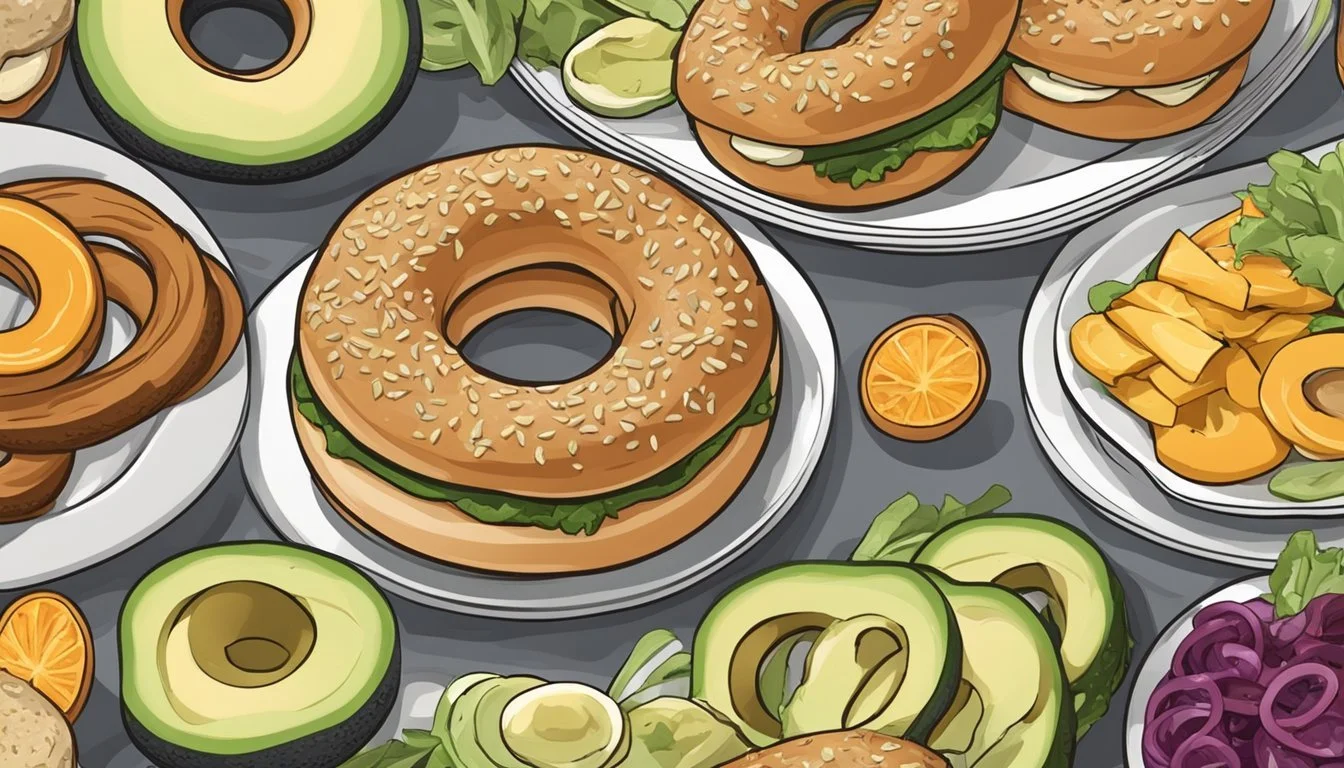Are Bagels Vegan?
Understanding the Basics of Bagel Ingredients
Bagels originate as a popular bread product known for their dense, chewy texture, with a distinctive hole in the middle. Traditionally made from a simple dough that includes flour, water, yeast, and salt, bagels are then boiled before being baked which gives them their unique taste and texture. This basic recipe aligns with vegan dietary standards, which exclude animal products and by-products, hence plain bagels often fall into the category of vegan-friendly foods.
However, the vegan status of bagels can vary depending on additional ingredients and toppings. Some bagels incorporate non-vegan items like eggs, milk, honey, or L-cysteine—an amino acid sometimes derived from feathers or human hair—into their dough. Moreover, toppings and spreads often paired with bagels, such as cream cheese or butter, are not vegan, but there are plant-based alternatives available.
Many bakeries and brands have recognized the dietary preferences of their customers and offer clear labeling to help identify vegan options. For example, establishments like Panera Bread provide vegan-labeled bagels, ensuring that those adhering to a vegan lifestyle have access to suitable choices. It's important for vegans to review ingredients or confirm with staff to ensure that the bagels they select are completely free of animal-derived ingredients.
What Makes Bagels Vegan?
When determining whether bagels are vegan, it's essential to scrutinize the ingredients and the preparation process. Vegan bagels avoid all animal-derived components, focusing on plant-based elements for their constitution.
Key Ingredients in Vegan Bagels
Vegan bagels are composed primarily of wheat flour, water, yeast, and salt. These ingredients are plant-based and serve as the foundation for creating the dough, which is then boiled and baked to produce the dense and chewy texture characteristic of bagels.
Wheat flour: Provides structure
Water: Binds ingredients
Yeast: Helps the dough rise
Salt: Adds flavor
Non-Vegan Ingredients to Watch Out For
Certain ingredients used in bagel production may disqualify them from being vegan. Watch out for egg, milk, honey, and dairy derivatives which are common non-vegan components. Reading the ingredient label carefully is vital for vegans to avoid these additives.
Egg: Sometimes used for glaze or dough
Milk: Can be found in the dough
Honey: Occasionally used as a sweetener
L-cysteine: An amino acid often sourced from feathers
Common Vegan and Non-Vegan Bagel Varieties
Vegan bagel varieties often include plain, whole wheat, cinnamon raisin, blueberry, and sesame among others. Non-vegan bagels may be evident by their inclusion of toppings or fillings like cheese, egg wash, or a honey glaze. The ingredient label and manufacturer details can provide clarity on the bagel’s vegan status.
Vegan: Plain, Sesame, Poppy
Non-Vegan: Cheese, Egg
Critical Factors in Vegan Certification
Vegan certification requires that a product, such as a bagel, must not contain any animal-derived ingredients and must not be processed on equipment that is used for non-vegan foods. The assessment by a reputable body assures vegans of the product's compliance.
Vegan Alternatives to Traditional Ingredients
In cases where non-vegan ingredients are typically used, vegan-friendly alternatives include plant-based milks, egg substitutes, and vegan cream cheese for spreads. These replacements allow for a wide variety of bagel enjoyment without animal by-products.
Egg substitutes: Plant-based binding agents
Plant-based milks: Soy, almond, oat milks
Vegan cream cheese: Made from nuts or soy
Misconceptions About Bagels and Veganism
A common misconception is that all bagels are inherently vegan. However, the presence of non-vegan ingredients like dairy, eggs, or honey in certain varieties challenges this notion. It's essential to confirm the vegan status through ingredient checks and manufacturer information.
How to Identify Vegan Bagels
Identifying vegan bagels requires careful examination of their components. Vegans must be vigilant to avoid animal-derived ingredients often present in seemingly plant-based foods.
Reading Ingredient Lists
A consumer should start by meticulously inspecting the ingredient list on bagel packaging. Classic bagel ingredients include flour, water, yeast, and salt — all inherently vegan. However, non-vegan items like milk, honey, and L-cysteine (an amino acid derived from human hair or duck feathers) can be present. Animal-derived ingredients should be absent for a bagel to be considered vegan.
Looking for Vegan Labels
Vegan certification labels serve as a reliable indicator of vegan bagels. These labels mean the product has been evaluated for vegan standards. Presence of words like "vegan" or symbols such as a certified vegan logo convey that one can trust these bagels to not contain ingredients like milk or honey, which may be used as sweeteners.
Understanding Dough Conditioners and Additives
Bagels may include dough conditioners and additives for texture and shelf life, which need scrutiny. An ingredient to be wary of is L-cysteine, used in dough conditioning. Plant-based alternatives exist, such as molasses, used as a sweetener and to promote browning. One should verify that conditioners and additives are from non-animal sources, as they are not automatically vegan.
Popular Vegan Bagel Brands
With a rise in plant-based diets, several bagel brands have emerged as vegan-friendly options. This section touches upon popular brands offering vegan bagels and factors to consider when selecting such brands.
List of Vegan-Friendly Bagel Brands
Dave’s Killer Bread: A brand with a commitment to organic ingredients, offering Plain Awesome, Epic Everything, and Boomin' Berry flavors that carry a vegan-friendly tag.
Thomas’ Bagels: Renowned for a broad presence in grocery stores, several of Thomas’ varieties, including their plain bagels, have been confirmed to not contain animal-derived mono- and diglycerides.
Panera Bread: This chain is accommodating for vegans, with Panera making it easy to spot vegan items on their menu. Their plain, blueberry, cranberry walnut, and sesame seed bagels are all vegan-friendly.
Trader Joe’s: Known for a selection of natural and organic products, Trader Joe's offers a variety of bagels that suit vegan dietary restrictions.
Einstein Bros: While not all bagels here are vegan due to certain toppings and flavorings, there are vegan options available at this well-known bagel establishment.
It's noteworthy that coffeehouses like Starbucks provide vegan bagel options, adding convenience for those on-the-go.
Considerations When Choosing bagel Brands
When evaluating whether a bagel is vegan, scrutinizing the ingredient list is crucial. Ingredients to watch for include egg, honey, L-cysteine, and enzymes that may be animal-derived. Additionally, some bagels may have a non-vegan glaze applied for sheen.
Consumers may also look for vegan certification on packaging or consult the manufacturer directly for confirmation. This ensures that cross-contamination with non-vegan ingredients during the manufacturing process is minimal or non-existent. Brands like Dave’s Killer Bread and Thomas’ Bagels often provide this transparency and are preferred by vegans for this reason.
Moreover, establishments such as Bruegger’s and Noah’s may not have vegan certification, but still offer bagel options suitable for vegans by default, depending on their preparation process and ingredient selection. It is, however, always recommended to inquire in-store to confirm the vegan status of specific offerings.
Making Vegan Bagels at Home
Creating vegan bagels at home is a satisfying process that allows for customization to personal taste preferences, with vegan-friendly ingredients and baking techniques yielding a perfect chewy and golden crust.
Vegan Bagel Recipes
The foundation of a good vegan bagel begins with the classic combination of flour, water, salt, and yeast. One can opt for whole grain flours or gluten-free alternatives to suit dietary needs. To impart distinct flavors, incorporating various seeds, grains, and herbs can elevate the recipe. Some popular additions are sesame seeds, poppy seeds, dried garlic flakes, or onion bits for a savory twist.
Ingredient Substitutions for Vegan Bagels
Traditional bagel recipes often include non-vegan ingredients like dairy products. However, by using plant-based substitutes, one can easily maintain the integrity of the bagel while keeping it vegan. For instance, replace honey with agave syrup or sugar to activate the yeast. Additionally, achieving a rich taste and creamy texture typically provided by dairy can be accomplished with vegan cream cheese, made from non-animal-derived ingredients.
Baking Techniques for the Perfect Vegan Bagel
The method of baking vegan bagels is crucial for achieving the authentic texture. Bagels should be boiled before baking to create a distinct chewy crust. Boil the shaped dough in water that has a touch of sweetener, such as brown sugar or barley malt syrup, for 30 seconds on each side. Then, bake in a preheated oven at 425°F (220°C) until they are golden brown, usually for about 20-25 minutes. Cooling on a wire rack ensures a crispy exterior.
Serving and Topping Vegan Bagels
When serving vegan bagels, one should thoughtfully select toppings that complement the bagel's flavor without containing animal products, focusing on a balance of savory and sweet options, and considering common allergens.
Savory and Sweet Topping Ideas
For a savory breakfast, avocado, hummus, or a spread made from cashew cheese are excellent vegan-friendly toppings that enhance a bagel's taste without the need for dairy products or meats. Spices like garlic or toppings like olives can add depth to these spreads.
Savory spreads: Vegan cream cheese, Tofu scramble
Sweet spreads: Fruit compotes, Pure maple syrup, Agave nectar
Sweet toppings often include fruits like strawberries or blueberries, which can be used fresh or in a strawberry jelly. Dark chocolate chips offer a dessert-like experience for those with a sweet tooth. For added sweetness without honey, one can opt for agave nectar or other plant-based sweeteners.
Pairings and Recipes for Vegan Breakfast
To create a satisfying vegan breakfast, one might pair a well-topped bagel with sides like a fruit salad, a glass of almond milk, or a vegan yogurt parfait. Recipes for vegan breakfasts often use bagels as a base for sandwich fillings like tofu scramble or tempeh bacon, adding both substance and flavor.
For those who enjoy baking, homemade bagels can be crafted with flavors such as rye or cinnamon-raisin. By baking at home, one ensures that all ingredients, especially sweeteners and fillings, comply with vegan standards.
Beware of Non-Vegan Topping Traps
Vegans must be vigilant, as common toppings like cream cheese, butter, and smoked salmon are not vegan-friendly. Also, some less obvious products like certain brands of peanut butter may contain honey, and mayonnaise typically includes eggs.
Vegan cream cheese is a suitable substitute for dairy-based cream cheese, and there are numerous plant-based butter alternatives. Instead of tuna, one can opt for chickpea-based mock 'tuna' salad. Always check labels for non-vegan ingredients and additives.
By navigating the bagel topping landscape with these guidelines, consumers can enjoy a multitude of vegan options that are delicious, satisfying, and aligned with a vegan lifestyle.




